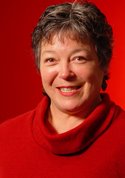Mary - Change Keeps Nursing Fresh
Mary -

My love for horses turned into a love for nursing. My father worked for a physician who raised horses and I would hang out with the horses and witness the physician’s caring attitude toward the animals. He was one of the most caring people I’d ever met. When I became old enough, he asked me to help him in his practice and I saw that he loved caring for people just as much. I decided to help people the way he did. Caring and compassion is what lead me to nursing, but variety is what keeps my interest.
I’m the kind of person who needs to be constantly challenged with new learning so I can continually develop my skills. So every few years I change my nursing focus. If I’m not learning, I get bored and then I’m not taking the best care of my patient. Every patient is different and brings his or her unique needs. I feel I can take on any nursing challenge with my knowledge and skills.
I also strive to earn patients’ trust by approaching their cases with a fresh, open mind and by conveying that their health is MY focus at this time. The patients are so appreciative and they show it in many different ways. I feel great inside when they say things like, “I really like how you’re caring for me.”
Some nurses hesitate to change from one area of nursing to another. Those are the nurses prone to burnout. They can tend to get stale and stagnant in one position. I think they feel trapped."Change doesn't hurt. It makes things better." Nurses need to pick up the student mindset and learn again and not be fearful of change because change means growth. It makes things better. We also need to be open to learning from each other. When nurses feel stale, yet have so much fear they won’t do anything about it, they become resentful towards others especially new nurses who come in with fresh attitudes and ideas.
Conversely, it’s interesting to watch how new nurses fresh out of school think they know it all. They could easily lose heart if there wasn’t a mentor nurse to encourage them. New nurses need to listen to those of us who have experience, because there is so much more to know and they’ll learn faster that way. But some insist on learning things on their own. They often flounder and sometimes even fail because of their lack of practical experience and unwillingness to ask questions. There’s really nothing I can do for those nurses. I can’t force them to accept the knowledge I’m willing to give.
Work environment is important to all nurses, and it is shaped from the top down. My current supervisor is an awesome person. She is my inspiration. She’s probably one of the most direct and outspoken people I’ve met in my career. She’s easy to talk with and she addresses our concerns immediately. Because I have a voice and am respected for my opinions, I find this to be one of the best jobs I’ve had. She understands that she needs to keep the staff happy on the job. Happy staffs make happy patients.
Speaking up and advocating are nurse care competencies and nurses need to find their voice and speak up for patient care. We are involved with patients more than any of the other health care providers. We have first-hand knowledge of how the patients’ case has evolved through the system. I’m not afraid to address things that I dislike or disapprove of with physicians or other staff members. I wish nurses would take it up with insurance companies who are dictating our patient care - not every patient can go home within two or three days after a surgery and insurance companies are demanding premature release.
Nurses are in a position to make change happen for our patients, for our profession and for the system.
Power Strategies: Resolve, Courage, Growth
go back to main page










